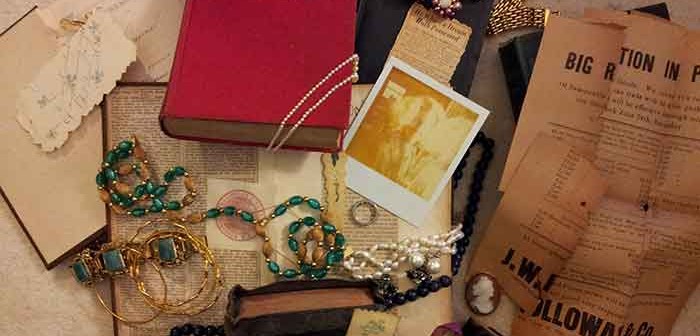If you walked into my house right now, you’d probably be worried about my mental health. No, I’m not sitting next to the Christmas tree, crying my eyes out, hair electrified, nightgown dirty. And I’m not laughing maniacally while drinking a grasshopper with my cereal. Truth is I’ve pulled down most of the old books off the shelves and I’m looking for clues. I’m playing detective. We have several dozen books that go back to the late 1800s and I’m convinced these long ago readers may have left behind little signs of who they were and how they lived.
What a treasure chest. Newspaper clippings, advertisements, crosses, crests, handmade bookmarks, book reviews and more all slid sideways and fell out as I cracked open these dusty creaky forgotten books. I didn’t find any love letters, nor solve any whodunits nor stumble upon any love children born in turn of the century Virginia. But I did find. . .
A photo of Granville’s Uncle Jim, looking crisp and pleased with himself. The photo fell out of a copy of Will Durant’s Caesar and Christ; Uncle Jim was a religion professor at Mary Baldwin College and I would imagine the photo was from his younger teaching days. (Author’s Note: “Look at the photo I found of Uncle Jim in an old book!” “Uh, that’s not Uncle Jim,” said my husband. “Well, who is it?” I have no idea” which led me to a feeling of defeat.)
Out of a copy of Voices of the Night. Ballads and Other Poems by Henry Wadsworth Longfellow, someone glued an award to Miss Louise Leeds inside the cover, a premium lesson from Sisters of Charity, the Immaculate Conception School in Washington, D.C., 1893. Miss Leeds must have been very pleased with herself because there is a handmade bookmark on white and blue flowered paper stock and someone has written this in flowing careful ink:
There is not an hour
or day or dreaming night
But I am with thee
Unfortunately, all the owners of these books have been gone so long it would take me considerable research to find out what Miss Leeds ever made of herself after excelling in school or who that man in Caesar and Christ really is. And most of these books don’t have marginalia. Books were expensive and people, thank heavens, did not have highlighters. (When I’m shopping for used books, if I see scribblings, back on the shelf the book goes. Same for library books.)
More results from my treasure hunt:
My copy of As You Like it from 6th grade which promptly turned me off Shakespeare for the next 25 years. My fat round handwriting is throughout and I wrote this under a song in Act 11, Scene 7: “Nothing can hurt a man more then ingrattitude.” (sic). I must have been expected to recite the “All the world’s a stage” section because there is a big parentheses with KNOW written next to it.
A pastel silk bookmark with this quote from John 3:16: “For God so loved the world, that he gave His only begotten Son, that whosoever believeth in Him, should not perish, but have everlasting life. (From a Bible belonging to Granville’s Aunt Frances. The family was living in Blackstone, Virginia near Camp Pickett; the year was 1942.)
A double exposed photo of me from the early years of our marriage, stuck in the middle of a copy of the Bandit of Hell’s Ben by Edgar Rice Burroughs, an author my husband has collected since childhood summer days at Squam Lake. I think the photo was taken in a Lynchburg bookstore so I suspect this Burroughs was bought there which means I was pregnant with Marlyn and just a few months from losing my mother. Inscribed in front of the book is this: “To Charles from “Daa” and “Mother,” December 25th, 1928. My husband’s first name is Charles so maybe this is one of the reasons he bought the book.
Edna Washington’s Book of Common Prayer holds two crosses made out of palm fronds.
A miniature Bible dated 1846 has an ivory page holder, slim with a carved flower and inscribed, “A present to Charles B.H. Matlock from his sister Mary, 1847.”
In a copy of Penguin Island by Anatole France, owned by my husband’s grandfather, out fell a typed postcard (dated 1924 with a one cent stamp) with this announcement: “Scout Officials! Attention! We can have all the publicity if we have news. The papers need troop news. Why not?” There is also a plea for pictures showing Scout activity, an invitation for Scouts to play golf and notice of the next Courts of Honor meeting.
There are several books from the 1920s given to Granville’s grandfather as gifts from his wife Cecil. All are inscribed for various birthdays and Frederic wrote “Finished” and the date in each book. He tended towards the Russians. (And of course I ache for Cecil; Frederic died at 30 from an abscessed tooth and left her with two small boys to raise.)
From a copy of Blind Raftery by Donn Byrne tumbled bird lists which belonged to my late father-in-law who was a very serious birder from the time he was 12. Three penciled notebook sheets with columns of bird counts from Bon Air and vicinity. Juncos 41, Meadowlarks 12, Pine Warbler 9. . .
While I looked for treasure, I couldn’t help but wonder about the book owners. Why did Mr. D.H. Gordon own a copy of Voltaire’s writings in 1921? Did he really read it? Why did Mr. Goldburn (though it’s hard to read the fountain pen markings, especially since it was 1848,) why did he cut out two newspaper articles on Crabbe’s Synonymes for his book English Synonymes with Copious Ilustrations and Explanations, Drawn from the Best Writers? Mr. Goldburn then goes on to litter the book with a few newspaper clippings like this: “The rage of party, the rancor of personality, the bitterness of malice, however, dignified by wit, or pointed by ridicule, exist but for the day which bears them.” Mr. Goldburn would be frustrated with me because I find this opaque. What interests me by far is what it written on the back of the cut-out: “All drivers dress in Livery. Saddles Horses, well-broken and stylish to let for Ladies and Gentlemen, with Grooms to follow. 14 years experience on the Back Bay.”
In Mr. Lewis B. Betty’s copy of Pickwick Papers I found an ad for J. W. Holloway and Company in Smithfield, Virginia from 1911 where I could have bought a parasol for as little $3.15 and a hammock for $2.50. When I opened the piece of paper, it promptly split and fell apart in my hands so I guess it’s been awhile since someone in our family read Pickwick Papers.
The sun sets on another January day. It’s time to reheat the tea and think about dinner. I look at my floor littered in old books and paraphernalia and I dream about these readers from long ago. What lives did they lead? What secrets did they have? Was I really expecting an erotic letter to fall out of Little Dorritt?
Perhaps not, but this is what I found written in my copy of Agatha Christie’s Peril at End House (1931): Betty Jordan is a sissy. Edward B. More is a sissy.
In spite of the dust, yellowed pages and cracked spines, the years just fall away.



